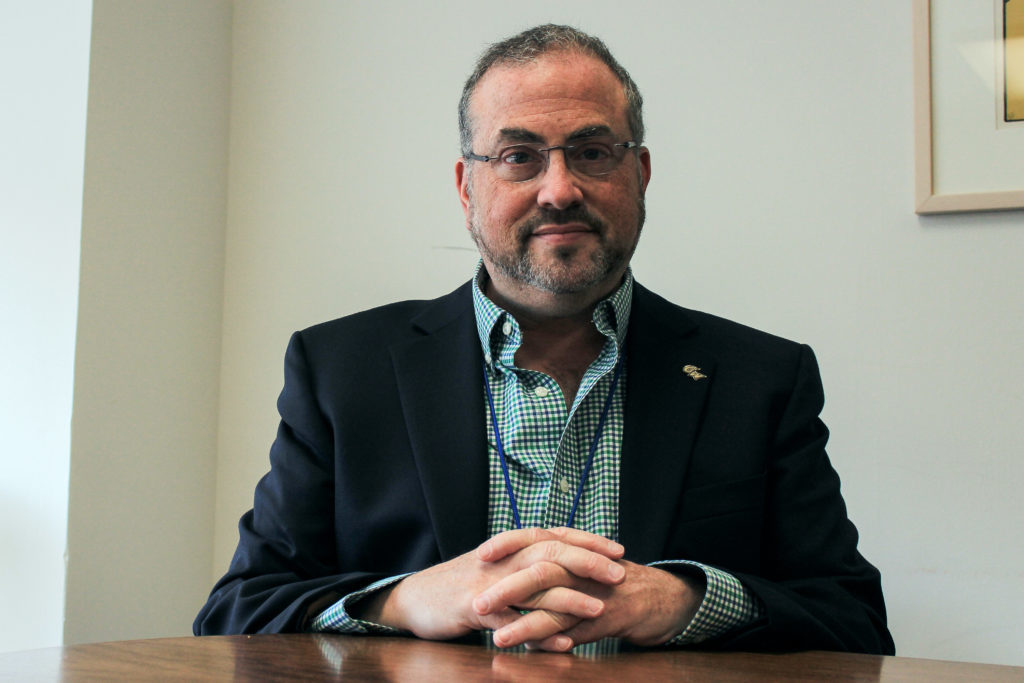The former leader of the Colonial Health Center is alleging the center’s top officials made “minimal” efforts to provide high-quality health care to students during his short tenure at GW.
In a January letter to three top administrators, Glenn Egelman, the center’s former associate dean, wrote that the CHC was plagued by issues like a lack of transparency when billing students and a failure to ensure its care met national quality standards. He alleged the center also exhibited a “long-term lack of guidance, supervision and support,” leading to a toxic culture for its employees.
“I cannot reassure the campus community of the quality, safety or appropriateness of care provided at this onsite student healthcare facility,” he wrote in the letter, which was obtained by The Hatchet. “I do know that actions by current Colonial Health Center and student affairs leaders continue to have a negative impact on the care provided to students.”
Egelman suddenly resigned as the center’s first executive director in September after a six-month stint in the role. At the time, he repeatedly declined to say specifically why he stepped down, saying only that “things speak for themselves.”
“I cannot reassure the campus community of the quality, safety or appropriateness of care provided at this onsite student healthcare facility.”
Students who had started to work with Egelman on health care initiatives were also shocked by his departure, saying he seemed excited to propel student-led projects to improve GW’s health services, which have long had a reputation for low-quality and inefficient care.
Student leaders renegotiated a new student council in the fall to air grievances and concerns about student health with administrators – a project initially conceived during Egelman’s tenure.
The letter, which was addressed to University President Thomas LeBlanc, Provost Forrest Maltzman and Vice Provost for Enrollment Management and Retention Laurie Koehler Jan. 28, was sent just months before officials announced major changes to student health services, including a health insurance mandate and an increase in the number of free mental health sessions offered.
Officials said the overhaul was a direct result of student advocacy to improve the CHC in recent months, which continued after Egelman resigned.
The updates will also include implementing an electronic record-keeping system by next summer – a project officials initially confirmed last fall – which Egelman said had been a priority for him during his short-lived tenure. He said CHC’s physical health services and psychiatry departments used paper records, while Mental Health Services kept electronic records.
In the letter, Egelman reiterated his support for the electronic record-keeping system, saying that without it, students were at risk of receiving “potentially dangerous and conflicting medications and healthcare advice from staff within the same facility.”
“Fledgling efforts towards patient safety and quality towards student engagement, towards community health promotion and towards interoperable electronic healthcare solutions have fallen by the wayside,” he wrote.
The one-and-a-half page letter did not include specific concerns or examples of risky CHC practices and did not allege any malpractice had occurred at the center during his tenure.
University spokeswoman Lindsay Hamilton said the University believes the CHC and its staff “provide quality care for students” and that they look into “all complaints about health services.”
“The University is consistently evaluating the CHC and recently announced enhancements that will further improve the experience for students when they visit the CHC,” she said in an email.
Hamilton declined to say when officials first received the letter, how they reacted to it, whether the University responded, how officials have worked to address Egelman’s concerns about CHC operations and if the recently announced updates to the CHC stemmed from his concerns. She also declined to say if officials addressed Egelman’s claims that the center had a long-term lack of supervision and guidance.
In an interview last week, Egelman denied mailing the letter to The Hatchet, which was anonymously sent to an editor.
He said he sent the letter to top administrators after departing from the University because he was troubled by the misconduct he had seen in the office and didn’t feel that his concerns were heard after repeating them to his supervisor, whom he declined to name, on a weekly basis during his time at the center.
“It weighed on me that the information that I had learned while there was not necessarily being passed on or communicated to the University administration that remained,” he said.
Egelman said he had a phone call with two staff members from the Office of the Provost and the Office of the General Counsel in early March in response to the letter, who were “very appropriately concerned about the letter, very concerned about student well-being.”
He said he offered to work with officials to address the issues noted in his letter, but they declined and “thanked me for my time.”
Egelman said one of the main issues he saw in the health center was a failure to live up to national standards. He claimed the center did not regularly re-evaluate health care methods to ensure that patients are provided with the best health services and didn’t fully assess procedures after mistakes had been made.
He said the center’s officials were not transparent about billing with students, leading to misconceptions about why students were charged different amounts for seemingly similar health services. The CHC didn’t have enough support staff to escort students to their specific appointment, meaning other students could determine the reason why a patient was visiting the center, he said.
He added that because hiring processes for the center’s medical staff are not managed by a central figure – and instead are managed by the CHC’s individual mental, physical and psychiatric units – there is no general way to guarantee that all of the CHC’s staff members are fully licensed when they are hired.
“There were different opinions and expectations as to what appropriate credentialing is,” Egelman said.
Silvio Weisner, the former leader of Mental Health Services, was forced to resign in 2015 after he was found unlicensed to practice psychiatry in the District. He was one of three mental health staffers who were unlicensed at the same time that year.
“There were different opinions and expectations as to what appropriate credentialing is.”
The CHC, which opened in the Marvin Center in 2015, was meant to centralize both the physical and mental aspects of student health in one location. This came after a string of student suicides on the Mount Vernon Campus. Egelman was the first leader of the centralized center.
During his time at the CHC, Egelman said he did not have “any firsthand knowledge of medical malpractice or medical misdemeanor occurring at the facility” – but that there was a constant “risk” of negligence. He said students should not be afraid to visit the CHC for care – especially because student leaders are so invested in reforming it.
“They’ve allowed me to sleep at night again,” Egelman said of student leaders. “I think, though, that although there are still significant issues that need attending to, we’re seeing at least a movement and direction that is positive.”
Dani Grace and Rebecca Leppert contributed reporting.





